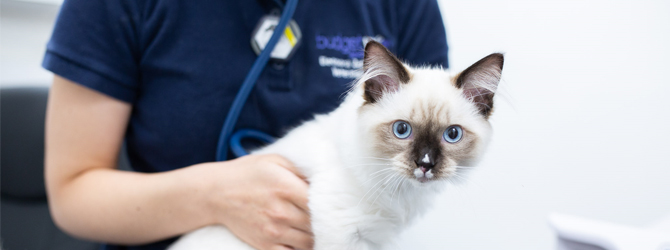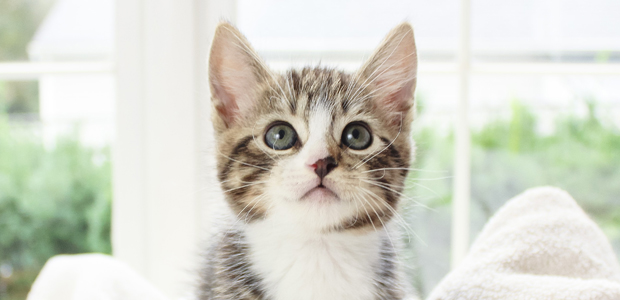Ensuring a Healthy Start: Preparing for Your Kitten's First Vet Visit
Welcoming a new kitten to your family is an adventure – it’s an exciting time, filled with firsts. And there’s nothing more important in your kitten’s early development than introducing her to your local vet.
Establishing a relationship with your vet
If you don’t already have a trusted vet, enter your postcode on the Find a Vet page for details of your nearest veterinary surgery – or see our article on choosing the right vet. It’s vital to establish that trusted relationship soon after welcoming your new kitten, to give her the best possible start in life.
As soon as you know when you’ll be picking up your new kitten, contact your local vet to make an appointment for her first check-up and registration. This initial visit is an important step in caring for your kitten’s health and wellbeing.
What to expect when you take your new kitten to the vet
When you arrive at the vet with your new kitten, the receptionist will welcome you and may give you some forms to fill in. These forms will ask for your contact details and information about your new pet, such as her age, name, and date of birth. Some practices will already have asked for these details over the phone when you made the appointment.
(Of course, if you’ve been going to this vet for a while, they’ll already have your contact information, but you’ll still need to give them full details of your new pet.)
Once you’ve completed the forms, you’ll be introduced to the vet, who will weigh your kitten, and complete a clinical examination. This will include listening to her heart, looking at her skin and feeling her tummy, among other things.
Examining your kitten: what your vet will check
- The ears, eyes, and teeth
- The skin, to check for dryness, sores, fleas or ticks
- The heart, to detect any heart murmur or irregular heartbeat
- The stomach and belly button, for any swelling, pain or abnormalities
- The lungs, using a stethoscope
- The joints, for normal movement
- The genitals, for any discharge or abnormalities
The vet may ask you a number of questions about your kitten’s diet, health, toilet training and how well she’s settling in to your family. He or she will also give you the chance to ask any questions you have about your kitten’s health, behaviour or wellbeing.
Read More: What's the best food to give my kitten or cat?
Protecting your kitten from fleas, ticks and worms
It’s vital to get into a routine of protecting your new kitten from fleas, ticks and worms. As well as being irritating to your feline friend, these nasty critters can carry serious disease. Your vet will recommend the best regular treatment to keep these pesky parasites at bay, they may even discuss how to save money by signing up to a Pet Health Club.
Read More: Does my cat have fleas?
Vaccinating your kitten
Depending on your kitten’s age at the time of her first appointment, your vet may recommend vaccination against a number of conditions, including feline leukaemia.
Your kitten’s first vaccinations are due around eight weeks of age, normally followed by a booster injection three to four weeks later. Your vet will talk to you about the options for vaccination, and the conditions regular injections can help protect your kitten from contracting.
Your kitten is not protected to go outside until at least 1 week after the last vaccination – this is very important. For more details, read our article on cat vaccinations.
Read More: Common questions about kitten vaccinations
Microchipping your kitten
While cat collars can come off, and even increase the risk of injury, cat microchipping is a safe and permanent way to identify your cat if she gets lost.
The microchip is a tiny device placed under your kitten’s skin. Microchipping is a quick, simple and relatively painless procedure, and once it’s in place it won’t bother your cat.
Each microchip has a unique number that’s stored on a database, and corresponds to your details. If your cat becomes lost or stolen, a quick microchip scan helps reunite you quickly. Your vet will provide full details of microchipping services.
“It’s vital to get into a routine of protecting your new kitten from fleas, ticks and worms. As well as being irritating to your feline friend, these nasty critters can carry serious disease.”
Read More: Cat microchipping - how and when to get your cat microchipped
Neutering: spaying or castrating your kitten
Neutering is the surgical process of preventing your pet from reproducing. Male cats or kittens are castrated, and female cats are spayed. This is a vital part of responsible cat ownership.
Your vet will provide full details of the neutering services available, and talk you through the best time to have this done.
Help and advice on kitten ownership
For expert advice on all aspects of kitten health, get in touch with your local vet.
Find your nearest vet using our Find a Vet page, or speak to a vet online using Online Vets.


